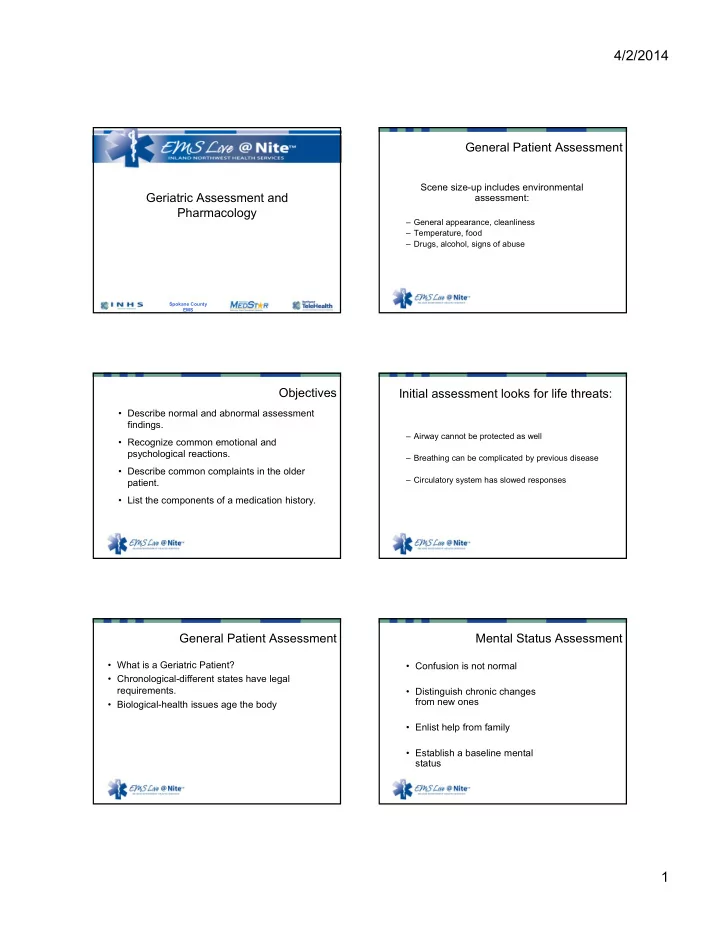

4/2/2014 General Patient Assessment Scene size-up includes environmental Geriatric Assessment and assessment: Pharmacology – General appearance, cleanliness – Temperature, food – Drugs, alcohol, signs of abuse Spokane County EMS Objectives Initial assessment looks for life threats: • Describe normal and abnormal assessment findings. – Airway cannot be protected as well • Recognize common emotional and psychological reactions. – Breathing can be complicated by previous disease • Describe common complaints in the older – Circulatory system has slowed responses patient. • List the components of a medication history. General Patient Assessment Mental Status Assessment • What is a Geriatric Patient? • Confusion is not normal • Chronological-different states have legal requirements. • Distinguish chronic changes from new ones • Biological-health issues age the body • Enlist help from family • Establish a baseline mental status 1
4/2/2014 Assessing the Chief Complaint Case Study 1 (continued) • Daughter tells you that her mother is not • Determining the chief complaint can be hard listening today • She tells you that her mother has had a cold • Start with what is bothering the patient most • Mrs. Randish is febrile, pale, and dry • Chief complaints may not be the life threat How would you approach the assessment of this patient? • Communication is a big component Assessment Case Study 1 (continued) • Pulse = 96 • Prioritize patient status • Respirations = 24 w/crackles in lower left side • BP = 110/70 mm Hg • Detailed physical exam • Pulse Ox = 90% • Hands are cold • Ongoing assessment is required Case Study 1 Case Study 1 (continued) • Dispatched for a 82-year-old woman • Signs include increasing agitation per daughter acting strangely; patient does not know why you are there • Medications include: Aricept, Paxil • Daughter states mother has • Last meal was breakfast Alzheimer’s • Events are increasing agitation since this morning 2
4/2/2014 Case Study 1 (continued) Top Ten Complaints of Older People • Mrs. Randish is becoming irritated with your questions • Shortness of breath • Chest pain • Daughter is able to calm patient down • Altered mental status • Abdominal pain • Patient agrees to treatment and transport. • Dizziness or weakness Case Study 1 - Conclusion Top Ten Complaints of Older People • Mrs. Randish is given oxygen to bring saturation into • Fever the mid 90’s • Trauma • Generalized pain • IV, cardiac monitor, 200 mL fluid bolus • Falls • Nausea, vomiting, diarrhea • She was transported to the hospital and diagnosed with pneumonia • Mrs. Randish was treated and released after 1 week Complaint-Based Assessment Medication Assessment • A comprehensive medication history is crucial. • Relies on patient to clarify complaint • Barriers • Requires in-depth verbal assessment – Cognitive impairment • Complaints can be misleading. – Underreporting • Treat patient based on complaint and symptoms. 3
4/2/2014 Medication History How do Medications Affect Assessment Statins (Cholesterol lowering medications) • liver problems and muscle aches • Prescribed medications • negative effects of cognition and memory • Adherence • Over-the-counter (OTC) medications • Herbal remedies • Other sources Prescribed Medications How do Medications Affect Assessment • Obtain a complete list, including doses. Anti Depressants • Check prescribing doctor. • Nausea • Look for new medications. • Insomnia • Ask about stopped medications. • Agitation • Diarrhea Common Prescribe Medications How do Medications Affect Assessment • Cholesterol lowering medications (Statins) Beta Blockers • Anti Depressant medications (SSRI) • Reduce heart rate • Beta Blockers • Reduce blood pressure • Constrict air passages 4
4/2/2014 POST-TEST Adherence to Prescription 1. Geriatric patients always tell the truth about their recreational drug use. • Determine if medications are taken as a) True prescribed b) False 2. Geriatric patients are always mentally altered. a) True • Assess if medications are prescribed and not b) False taken. 3. During the physical examination the older patient must be handled gently so as not to: a) Cause any additional injury. • OTC and herbal medications: b) Confuse the patient with your specialized equipment. c) Overwhelm the caretaker with your techniques. – List all that are taken d) Force the patient to receive unwanted care. – Determine why they are taken Other Sources POST-TEST 4. Since older patients are less likely to show severe symptoms in certain conditions, it can be difficult to: • Has the patient taken another person’s a) find a radial pulse. medications? b) determine a patient’s priority. c) assess for foreign body obstruction. • Is there evidence of alcohol or illicit drug usage? d) note sudden onset of weakness. 5. Older patients are more sensitive to drugs. a) True b) False Summary Questions? • Aging affects assessment findings Contact: Carolyn Stovall • Emotional and psychological changes 509-242-4264 should be evaluated 1-866-630-4033 • Medication history is an important part stovalc@inhs.org of assessment Fax: 509-232-8344 5
4/2/2014 SAVE THE DATE Updates Please •All Certificates of Completion will now be available for you to print on our website. Certificate templates will be posted to the website one week after the presentation and remain on the site for one week. •Please also email any organization contact information changes to: healthtraining@inhs.org Special thanks to Sheila Crow Stitchin’ Dreams Embroidery wcsocrow@yahoo.com For providing our Secret Question prize 6
Recommend
More recommend